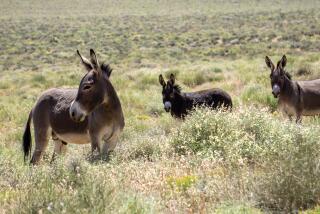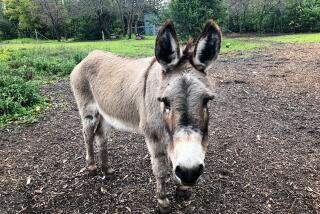City Funds Sought for Natural History Museum
- Share via
FILLMORE — Some unlikely guests will inhabit the City Council chambers here tonight--among others, a South Asian binturong, a distant cousin to the better known mongoose, that will feast on sliced bananas courtesy of Mayor Roger Campbell.
Before the meeting gets underway at 6:30 p.m., other council members will join Campbell in nurturing the collection of lesser-known residents of the animal kingdom.
The uncommon display is designed to promote a tentative agreement between the city and the nonprofit Wildlife Educators of America that will bring a natural history museum to this bustling farm community that wants to become a tourist destination.
“It’s another piece of the puzzle for making Fillmore a destination spot in Southern California,” said Campbell, who worked for two months to bring the museum to downtown.
“We need more than just a train, more than just a historic downtown and more than a new City Hall to make all of this [revitalization] work,” he said.
The agreement calls for the city to contribute $100,000 toward the lease and start-up costs for the museum, which organizers want to open next spring.
*
Located in a vacant building along the 400 block of Central Avenue, the museum will feature interpretive displays and wildlife exhibits, and will also host live animal exhibitions on weekends, said Karl Anderson, executive director of the 6-year-old organization.
“Our mission is to foster a greater awareness of our natural world through educational programs and experiences,” said Anderson, who has overseen a 120-acre preserve outside Fillmore for several years.
“There’s a lot lacking, especially in the public school system, in relation to teaching about biodiversity,” Anderson said. “The average person in our country is only familiar with about 1% of the animal species on our planet.”
Among other activities, the group offers classes in animal husbandry, zoology and animal behavior. Volunteers also go into area schools for hands-on educational programs.
Other rare and little-known animals cared for by volunteers at the nonprofit group include alligators, Gila monsters, armadillos and a kinkajou, a native of the South American rain forests better known as the honey bear.
As proposed, the participation agreement calls for the city to forgive 10% of the $100,000 package each year the nonprofit agency stays open.
In the meantime, Fillmore will receive a portion of the ticket sales and weekend exhibitions--money Campbell said should amount to $10,000 or more every year.
Should the museum close for any reason within the first three years, the agency would be required to pay back all of the money, Campbell said.
“The concern we all have when we look at something like this is whether it’s a good business plan, whether it’s viable,” he said. “This is. It will pull tourists up the street, away from the train.”
*
For years, Fillmore has been home to the famous “Movie Train,” steam and diesel engines long used by Hollywood producers. City officials say the museum project will add to the charm of the city of 12,000 people.
“It’s a real unique opportunity that we have something we can share with the public,” Councilwoman Linda Brewster said. “It will help with our tourism draw, which we’re trying to promote.”
After Fillmore suffered severe damage in the 1994 Northridge earthquake, city officials launched a more aggressive promotion and tourism campaign.
They only recently finished building a new City Hall and Central Park, and shops and the historic movie theater on Central Avenue breathed new life into the once-struggling downtown commercial district.
“I have a few questions that I’ll need to get answered [tonight],” Brewster said. “But overall, I’m in support of it.”
FYI
The Fillmore City Council is expected to approve an agreement tonight with the Wildlife Educators of America to open a natural history museum in downtown Fillmore. The nonprofit group, which promotes education of exotic and rare members of the animal kingdom, can be reached at (805) 524-9762.
More to Read
Sign up for Essential California
The most important California stories and recommendations in your inbox every morning.
You may occasionally receive promotional content from the Los Angeles Times.













